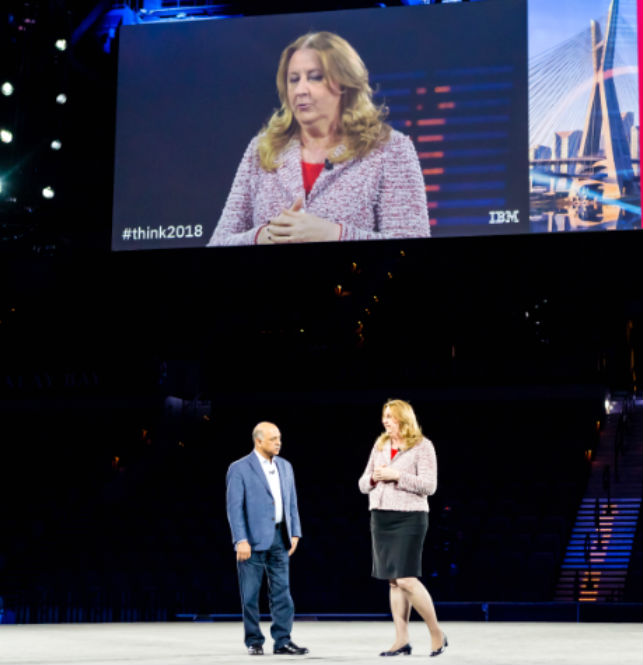Think 2018
Why Financial Services Firms are Turning to IBM Cloud Private
March 20, 2018 | Written by: Denis Kennelly
Categorized: IBM Cloud | Think 2018
Share this post:
This week at Think 2018, IBM’s top executives outlined how IBM is betting on multi-cloud. To understand why, you only have to look at the enterprise cloud market: According to IDC, 85 percent of enterprises will commit to multi-cloud architectures in 2018. And a recent RightScale survey showed enterprises are using an average of 5 public and private clouds.
IBM Cloud Private is front and center to IBM’s multi-cloud strategy. Launched just last quarter, the platform is designed to make cloud more accessible and easier for businesses of all sizes, providing a flexible but protected environment for running innovative and demanding applications.
Built on open-source Kubernetes container technology, IBM Cloud Private can be installed on a wide range of enterprise systems to create a private cloud with an architecture and capabilities consistent with the public IBM Cloud. This combination of flexibility and control is particularly important to companies in industries such as finance with high standards for security, compliance and reliability leading to strong early adoption of the platform.
More than 150 clients have already signed up for IBM Cloud Private including Brazilian bank Bradesco, Finland insurer Ilmarinen and Macedonian payments operator KIBS.

Walkiria Marchetti (right), CIO of Brazil banking giant Bradesco, talks Tuesday at the IBM Think 2018 conference with Arvind Krishna (left), senior vice president of IBM Hybrid Cloud and director of IBM Research, about Bradesco’s use of IBM Cloud Private to accelerate development of new digital services for clients.
Here’s what they’re doing with it and what was behind their decision:
Bradesco Adopts IBM Cloud Private as part of Digital Transformation
Brazil-based Bradesco, one of the world’s largest financial services companies with 77 million customer accounts, chose IBM Cloud Private to help accelerate development of new digital services for customers in a secure environment. Bradesco is already using IBM’s Watson AI system to assist employees with answering customer questions and IBM mainframes to support rapid growth in mobile transactions. Bradesco has now started using IBM Cloud Private to create new microservices that extend banking information, such as account balances, to mobile devices.
When asked why Bradesco signed up for IBM’s private cloud, Bradesco’s CIO Walkiria Marchetti explains that “IBM Cloud Private is part of Bradesco’s strategy to enable our customers to access their data and complete financial transactions wherever and however is most convenient for them. It advances this strategy by extending core applications to a cloud-native environment where our developers can more quickly launch and update digital services for customers while maintaining our requirements for security.”
Ilmarinen Speeds App Development with Cloud Private
Ilmarinen, the largest private insurer in Finland responsible for the pensions of over 1.1 million Finland residents and more than EUR 45 billion in investment assets, has been innovating by shifting applications to IBM Cloud Private to maximize existing infrastructure capacity, while allowing for more flexible allocation of IT resources depending on workloads. With a DevOps pipeline on IBM Cloud Private, Ilmarinen has been able to significantly speed up development cycles and cut infrastructure costs, cutting the total application release time from days to minutes. This is especially important with increased pressure on the world’s pension systems due to an aging population.
Ilmarinen’s Chief Technical Architect, Jani Itkonen is clear on his company’s motivations: “IBM Cloud Private is playing an important role in our strategy to scale and optimize our IT systems to meet business demands while improving our services to Ilmarinen’s clients. IBM Cloud Private offers a private and secure way to manage application containers on premises, on private cloud or over public clouds.”
KIBS Plans to Use Cloud Private to Help Meet Financial Services Regulations
Klirinski Interbankarski Sistemi AD Skopje (KIBS), a Macedonia-based payment system operator owned by 12 banks, has adopted IBM Cloud Private to help meet regulatory, security and availability standards while accelerating the development of digital services. Nations in the Western Balkans region, where KIBS operates, are now on the path of their closer integration with the European Union, adding new regulations for financial services companies.
KIBS CIO Marin Piperkoski tell us that “with digitization driving deep transformation across Europe, we understand the opportunity for financial institutions to reduce costs, reduce risk and enhance the customer experience. By selecting IBM Cloud Private, we are better positioned to enable collaboration across an ecosystem of organizations and create seamless and secure interactions across different online channels. It will also help us better respond to new regulatory requirements stemming from our integration with the EU.”
Just a few months after launch, IBM already is expanding the capabilities of IBM Cloud Private to provide even more support for accelerating the transition of companies in finance and other industries to the cloud. Our goal is make IBM Cloud Private the on-ramp to the cloud so that enterprises can deliver innovations quickly and securely to their clients, while benefitting from the myriad of services that the cloud has to offer.
For more details about IBM Cloud Private, visit here. For more information about new capabilities announced at the Think 2018 conference, visit here.
______________________________________________
And be sure to check out this new webcast: Financial Services in the Age of Hybrid Cloud.

General Manager, IBM Cloud Integration
It’s a Long and Open Road Ahead for Bus & Coach Travel
As one of the oldest forms of public transport, the bus occupies a special place in our hearts and lives. For more than a century, these vehicles have carried us to work, school, holiday destinations and festivals. But bus and coach companies can hardly afford to be sentimental nowadays. Technological innovations are creating new models […]
How a Hybrid Multicloud Strategy Can Overcome the Cloud Paradox
Public clouds have a lot to offer. Public clouds bring about agility, elasticity, and speed, which make a company’s IT shop become a lot more responsive to the needs of its business. By shifting workloads to the cloud, businesses can make great strides in reducing costs and boosting productivity. This allows them to focus on […]
Q&A with Hillery Hunter, VP & CTO IBM Cloud on IBM’s Software Transformation
A couple of weeks after having closed its landmark acquisition of Red Hat, IBM is announcing new cloud capabilities that will transform the way clients do business and accelerate their journey to the cloud. This includes: IBM Cloud Paks, Red Hat OpenShift on IBM Cloud, Red Hat OpenShift on IBM Z and LinuxOne, and Consulting […]


